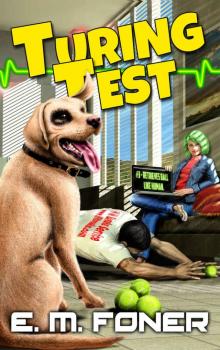- Home
- E. M. Foner
Spy Night on Union Station (EarthCent Ambassador Book 4) Page 2
Spy Night on Union Station (EarthCent Ambassador Book 4) Read online
Page 2
The complaining whirr of machinery was accompanied by a sudden jerk and a loud clank, leading Lynx to flex her knees in anticipation of a hard landing. Instead, after a horrible grating sound followed by the lights going out and then blinking back on, the elevator staggered to a halt. The metal door twitched several times, after which the first section slid partway open and stopped. The elevator car had halted well short of the floor, and the door wouldn’t budge when she pushed on it, nor would it respond to the button.
Suddenly it struck her that this was all a test and she smiled grimly. If EarthCent Intelligence wanted their agent recruits to prove their unflappability, she was just the girl for the job. Removing her bulky cloth coat, she tossed it through the opening to the basement floor, and with one fluid movement she slipped down after it, landing on her feet. A man with immersive-star looks rose from the old wooden chair next to the only door in sight, clapping slowly in appreciation of her performance.
“You must be Lynx,” he pronounced in a burred accent she couldn’t quite place. “They call me A.P. Malloy. The Old Man is waiting for you inside.”
“Did I pass the elevator test?” Lynx inquired archly.
“The elevator is broken,” he replied with an infuriating superiority that gave the impression of coming from old wealth, private schools, fast cars and long days at the polo grounds. But then he bent to retrieve her coat, brushing it off at the risk of getting dust on his own immaculate suit, and hung it on a bright red valve that was either a control for an ancient steam heating circuit or a shut-off for a sprinkler system. “The building has been condemned for some time, but the Old Man insists it’s perfect for our purposes and that taking the stairs is good for physical conditioning. Just knock and walk right in.”
The frosted glass of the door was carefully lettered ‘Acme Exporters’, with ‘B201’ centered just below, so Lynx tapped the door frame twice with her knuckles, turned the old brass knob, and entered.
“Please take a seat and I’ll be with you in a minute.” The man behind the sole desk in the narrow room spoke without raising his head. Other than the single wooden chair whose mate was currently in the hall outside the door, the space was uncluttered by furnishings or equipment of any sort. Lynx seated herself and took advantage of the time to study the person whom she hoped to soon be calling the “Old Man” herself.
As a description, the nom-de-guerre was entirely accurate, since the man looked to be well past his prime and accelerating towards decrepitude. His appearance reminded her of a common plot element in the old spy movies she had watched on long jumps, the retired war horse called back to action to clean up an intelligence service after it was penetrated by the enemy.
Other than a massive, old-fashioned watch on his right wrist, he wore no jewelry. Right wrist, that makes him a southpaw, Lynx noted to herself. He sported thick eyeglasses with heavy black plastic frames, giving him an anachronistic look in a world where even the poorest of the poor could afford walk-in robotic laser surgery at train station kiosks to correct most vision problems. An affectation? A disguise? His suit looked like nothing Lynx had ever come across in her wide travels, but maybe it was the current style for the upper crust of Earth society. She had only been to Earth a half a dozen times, and aside from a bit of tourism on the first trip, hadn’t stayed around any longer than business required.
“I’m Director Fordham,” he finally introduced himself, setting aside the file in which Lynx knew her entire life would be laid bare, down to the most personal details. She couldn’t even imagine the resources EarthCent Intelligence could call on, and she only hoped that a few of the less fortunate incidents she’d been tangled up in while trading far off the Stryx tunnel network had escaped their notice. “You are Lynx Hedgehouse?”
“Edgehouse,” she corrected him.
The Director scowled, and taking up the file again, scribbled on the sheets of paper in several different places. Lynx didn’t know if he was making notes to fire various clerks for incompetence or simply scratching out the capital H wherever her name appeared.
“Can’t afford display tabs?” she joked, hoping to steer the conversation onto a friendly path.
Fordham’s head jerked up in surprise and his features quickly resolved themselves into a frown. Lynx shifted uneasily in her chair when he didn’t speak immediately, kicking herself for trying to make a joke so early in the interview. It wouldn’t be the first time her sense of humor got her into trouble.
“Paper is the safest technology for keeping secrets,” he said finally. “All other forms of recordkeeping and communications can be hacked, altered or intercepted by aliens with superior technology. And if you’re in a tough spot, you can always eat the paper. Try doing that with a display tab.”
“Got it, sir,” Lynx responded with alacrity. “Should I use pen or pencil?”
Fordham fixed her with an intense stare and paused again, as if trying to decide whether she was making fun of him. Realizing too late that her quick response might have labeled her a wisecracker, Lynx waited on tenterhooks for his response.
“Pen,” he declared after a long wait. “Unless you can’t find one, in which case pencil will suffice.”
The Director and the potential agent regarded one another in silence for another long moment, and Lynx began to wonder if she had already failed the interview and he was simply waiting for her to figure it out for herself.
“Right, then,” Fordham suddenly declared. “You’ll be partnered with A.P. Malloy, our best agent. Do you have any questions before I call him in?”
Lynx was so taken aback by the news that she had passed the interview and was about to become an EarthCent Intelligence agent that she was almost speechless. Almost. But her lifelong habit of asking questions that nobody wanted to hear overcame her initial shock, and she rapidly organized her thoughts into a prioritized list of points that needed clarification.
“I do have just a few questions,” Lynx admitted, holding up her hand with her thumb and forefinger spread about an inch apart to indicate that she would only take a little of his valuable time. “I never actually heard of EarthCent Intelligence before I was, er, recruited at the Space Rats bar last night, and I don’t really remember too much of the conversation. In fact, I wasn’t sure if it really happened until your messenger did the nose-rub signal and slipped the address in my pocket at the spaceport diner this morning.”
The Director merely lifted one bushy grey eyebrow at this story and waited for her to continue.
“So, and I don’t want you to take this the wrong way because I really want to serve humanity and I think I’ll be a great secret agent, but I can’t help wondering how I was chosen. I spotted your recruiter at least an hour before he approached me. I thought he was just another jerk hitting on all the single women at the bar. But he explained right off that it was just a cover and he was there specifically to meet me.”
“Are you familiar with the recruitment process for the EarthCent Diplomatic corps?” the Director asked without his usual pause, as if he expected her question and was prepared with an answer.
“Of course,” she replied. “I always hoped I would hear from them out of the blue, but by the time I was twenty-four, I knew it wasn’t going to happen. I guess it didn’t occur to me that EarthCent Intelligence would work the same way.”
“If that’s it, I’ll call in A.P. Malloy now,” the Director said, reaching for the button on the front of his desk that looked like a salvaged doorbell. The wires ran to the edge of the desk that abutted the wall, where they hung down from a steam pipe, around which they were wrapped in a slow spiral like a growing vine. The pipe disappeared through the front wall to the right of the door, and if Lynx was correct, the wires must have come out in the hall just around the improvised coat rack.
“Hold on just a second,” Lynx pleaded, leaning forward and seizing Fordham’s hand before he could press the button. The Director froze like a statue, then slowly relaxed and settled ponderously back i
nto his chair.
“As you wish,” he replied after a long pause, during which she wasn’t sure if he was staring at her or through her.
“It’s just that I’m very curious,” Lynx said apologetically. “That’s part of why I think I’ll be a natural at intelligence work. I just can’t help wondering how EarthCent finally spotted me after I gave up, even though it’s intelligence work rather than diplomacy. I’m twenty-eight now, you know, and I’ve spent most of the last ten years trading around the fringes of Stryx space. Were you keeping tabs on me the whole time?”
The Director drummed his fingers on the table for a moment and appeared to be listening intently to the rhythmic sound produced. Then he smiled for the first time and gave the exact response she wanted to hear.
“I think you’ve answered your own question,” Fordham told her. “And there’s no better cover story for an agent than that of the independent trader. You can go anywhere at any time, and as long as you make a profit, nobody will question your motives.”
Lynx found herself relaxing a little, since nothing put her at ease more than being told she was right.
“I guess I was afraid that your recruiter was just asking women at random,” she confessed with a laugh. “Well, not exactly random, as I did notice he only approached women with red hair.”
“EarthCent has had very good luck with redheads,” the director replied, before harpooning her with his intense stare. “You don’t dye your hair, do you?”
“Not me,” she replied earnestly, though the question chipped into the pleasure she had experienced over being chosen for her unique talents as a trader and fearless adventurer. Maybe this was one instance where the less she knew the better, and she decided to stop asking questions lest she discover her main qualification for intelligence work was her shoe size. But she had to ask about training. “Will the training program take a long time? I have to know whether to leave my ship docked at the elevator anchor, or to move it into a parking orbit.”
“Docked at the elevator anchor is perfect,” the Director replied after his characteristic pause. “Our training program is based on an apprenticeship in the field. There are also some training materials you’ll need to study in your free time, of course. Now, if that’s everything?” he asked, as he reached cautiously for the doorbell, and getting no reaction from Lynx, pressed the button. When nothing happened, no chimes or buzzes, Fordham stabbed the button again, several times. For a moment he looked like he was ready to tear the device from the desk and throw it at the door, but he quickly regained control over his emotions and nodded to Lynx, saying, “Could you?”
Lynx rose from her chair and went to open the door and summon her soon-to-be partner, but the brass handle came away in her hand as the other end fell into the hallway with a clatter. She realized that there was a square shaft sticking out of the heavy handle she still held, so she fit it through the hole in the lock plate and turned. The door pushed open from the outside.
“I’ll fix that,” Malloy said, holding the door halfway open. “The set screw backed out, see? We’ll just put the handle back on the shaft and tighten the screw. It’ll be good for another hundred years.” Then he pulled an elaborate Swiss Army knife from his pocket and pried out the screwdriver attachment with a well-manicured thumbnail. In less than a minute, the repair was complete, and Lynx found herself standing side-by-side with Mr. Fixit in front of the Director’s desk. She had the weird feeling that Fordham was a justice of the peace and the two agents were getting married.
“I’m sure I don’t have to explain to the two of you the responsibilities and the sacred nature of a partnership between agents,” the Director spoke solemnly, giving Lynx the impression that he was reading from a prepared speech. “You will be living together in close quarters for long periods of time, so it’s of the utmost importance that you also respect each other’s privacy and remember that you are professionals doing a job, not just casual shipmates.”
“Shipmates?” Lynx asked in surprise. “It never occurred to me that I’d have to give up my ship to join, though I guess it makes sense you’d have some super-fast spy ship loaded with advanced weaponry for agents.”
“Quite the contrary,” the Director reassured her. “A secret agent’s only meaningful defense is a solid cover story. You and your ship are known quantities on the fringes of Stryx space, and you are to avoid confrontations at all costs.”
“So we’ll both be traveling in my ship?” Lynx asked, squinting at the Director through one eye, her default facial expression when striking a bargain for a cargo. Despite her relief that she could take the job without putting her ship into cold storage, she was beginning to feel a twinge of trader’s doubt as to the pocketbook of her new employers. “I don’t want to sound like a mercenary, but will there be any compensation?”
“EarthCent Intelligence agents can expect to earn as much as ambassadors,” he told her sternly. “Your salaries and ship expenses will be paid out of your trading profits, the remainder of which you will remit to the home office.”
“So, I’ll be working as a trader, just like I’ve done for the last ten years, except now, I’ll be paying salaries to Agent Malloy and myself, and anything left over goes to you?” she recapped slowly, hoping that there was an error of logic in her formulation.
“Exactly,” Fordham confirmed her suspicion. “Of course, we will provide a suitable starting cargo. We understand that you’ve had certain difficulties in the last year and have been seeking consignment goods.”
Lynx flinched at the Director’s words, which were unfortunately true. If he had said, “reduced to seeking consignment goods,” the description would have been even more accurate. Nine years of careful trading had allowed her to pay off the mortgage on her ship ahead of schedule, but something had changed the instant she didn’t have a regular payment to make. She had started taking stupid risks in search of a big score, even flying empty in preference to taking subsistence cargoes, and the last year had eaten through her savings. Her tunnel transit to Earth was only made possible by the charitable policy that the Stryx maintained towards human traders.
“And our mission?” Lynx inquired, striving to formulate the question in as few words as possible.
The Director pushed back his chair and slid open the wide, shallow desk drawer, removing a dingy white envelope that looked like something from the twenty century. He looked at the envelope, looked at the agents, shook his head, and then extended it towards them. Lynx and A.P. both grabbed for it, but Lynx was the faster of the two. She had never held a paper envelope in her hands before. It appeared to be glued shut in some way, and she was unsure how to proceed.
“Not here,” the Director said. “Open it when you get back to your ship. Your cargo is already waiting at the anchor satellite where you docked. Welcome to EarthCent Intelligence. And remember, if you’re caught, there will be no help from Earth. We’ll deny any knowledge of your existence.”
“Thank you,” Lynx said, even though she wondered what she was thanking him for. Then she stiffened as a hand pressed against her side, but it was just her new partner guiding her to the door. The handle worked perfectly, as A.P. had promised. He led her past the stalled elevator to another door, where they found the emergency stairs to the main lobby and exited the condemned building.
Three
“Welcome to the first meeting of the EarthCent Intelligence Committee, and let me thank those of you on different time schedules who woke up in the middle of the night to join the holoconference call. I want you all to know that while I can see you and you can see me, the hologram you see of the other committee members is being run through an anonymity filter. I point this out so you don’t believe your colleagues are all from a wildlife sanctuary. Also, our research department reports that it is traditional for members of secret committees to use code names, and I’ve chosen ‘Home Boy’ for myself. Are there any questions before we begin?”
“How do you pronounce the acronym?”
/>
“Could you be a little more specific?” Home Boy inquired in response. “And please, everybody, give a code name before you speak so we’ll know who is who.”
“Uh, Belinda,” the woman replied. “I don’t want to have to say ‘EarthCent Intelligence Committee’ every time I refer to our group. But I’m not sure how to pronounce ECIC. E-KICK?”
“Troll here. I vote for ignoring the capital ‘C’ in ‘EarthCent’ and going with EIC. Then we could pronounce it as ICE.”
“Toto here. How did you get from EIC to ICE? If anything, I’d pronounce EIC as EEK! And I thought there was an ambassador named Belinda on...”
“No names,” Home Boy cut Toto off mid-sentence. “Belinda, please choose a different code name, one that doesn’t incorporate any elements from your personal name. Troll, I have to agree that EEK makes more sense, but we may as well put it to a vote since that’s what committees do. All in favor of ICE, raise a hand. That’s one, two. Now all in favor of EEK raise a hand. That’s one, two, three. So the vote is three-to-two in favor of EEK with two abstentions.”
“Who abstains from voting on an acronym?” Toto asked in frustration.
“Pill Bottle here. I abstained,” said a man in an immaculate five-piece suit, the only attendee who had dressed formally for the holoconference. The anonymity filter had replaced his head with that of a baby elephant, who looked quite sophisticated in the suit, especially while elevating its trunk and mouthing the English words in perfect synchronization with the speaker.
“Lion here. I abstained as well,” admitted a sleepy-looking chimp wearing either a silk kimono or pajamas.
“Cowardly,” Toto muttered under her breath, but loudly enough for everybody to hear.
There was an awkward pause before Home Boy cleared his throat and asked, “Did everybody have a chance to watch the interview video? Just say ‘No’ if you didn’t have the opportunity yet. Everybody watched it? Great. My team here feels that the actor we chose to play the director did an excellent job, although he did rely heavily on subvocing for help whenever an unexpected question came up.”

 Last Night on Union Station (EarthCent Ambassador Book 16)
Last Night on Union Station (EarthCent Ambassador Book 16) Empire Night on Union Station (EarthCent Ambassador Book 18)
Empire Night on Union Station (EarthCent Ambassador Book 18) Space Living (EarthCent Universe Book 4)
Space Living (EarthCent Universe Book 4) Review Night on Union Station (EarthCent Ambassador Book 11)
Review Night on Union Station (EarthCent Ambassador Book 11) Assisted Living
Assisted Living Con Living
Con Living Freelance On The Galactic Tunnel Network
Freelance On The Galactic Tunnel Network Career Night on Union Station
Career Night on Union Station Career Night on Union Station (EarthCent Ambassador Book 15)
Career Night on Union Station (EarthCent Ambassador Book 15) Word Night on Union Station (EarthCent Ambassador Book 9)
Word Night on Union Station (EarthCent Ambassador Book 9) Soup Night on Union Station
Soup Night on Union Station Human Test
Human Test Spy Night on Union Station (EarthCent Ambassador Book 4)
Spy Night on Union Station (EarthCent Ambassador Book 4) Family Night on Union Station (EarthCent Ambassador Book 12)
Family Night on Union Station (EarthCent Ambassador Book 12) Party Night on Union Station (EarthCent Ambassador Book 10)
Party Night on Union Station (EarthCent Ambassador Book 10) Turing Test
Turing Test Alien Night on Union Station (EarthCent Ambassador Book 2)
Alien Night on Union Station (EarthCent Ambassador Book 2) Wanderers On Union Station (EarthCent Ambassador Book 6)
Wanderers On Union Station (EarthCent Ambassador Book 6) Vacation on Union Station (EarthCent Ambassador Book 7)
Vacation on Union Station (EarthCent Ambassador Book 7) Book Night on Union Station (EarthCent Ambassasor 13)
Book Night on Union Station (EarthCent Ambassasor 13) LARP Night on Union Station
LARP Night on Union Station Carnival On Union Station (EarthCent Ambassador Book 5)
Carnival On Union Station (EarthCent Ambassador Book 5) LARP Night on Union Station (EarthCent Ambassador Book 14)
LARP Night on Union Station (EarthCent Ambassador Book 14) Book Night on Union Station
Book Night on Union Station High Priest on Union Station (EarthCent Ambassador Book 3)
High Priest on Union Station (EarthCent Ambassador Book 3) Meghan's Dragon
Meghan's Dragon Human Test (AI Diaries Book 2)
Human Test (AI Diaries Book 2) Guest Night on Union Station
Guest Night on Union Station Date Night on Union Station
Date Night on Union Station